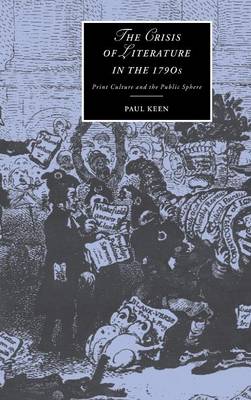Cambridge Studies in Romanticism
2 total works
This book offers an original study of the debates which arose in the 1790s about the nature and social role of literature. Paul Keen shows how these debates were situated at the intersection of the French Revolution and a more gradual revolution in information and literacy reflecting the aspirations of the professional classes in eighteenth-century England. He shows these movements converging in hostility to a new class of readers, whom critics saw as dangerously subject to the effects of seditious writings or the vagaries of literary fashion. The first part of the book concentrates on the dominant arguments about the role of literature and the status of the author; the second shifts its focus to the debates about working-class activists, radical women authors, and the Orientalists, and examines the growth of a Romantic ideology within this context of political and cultural turmoil.
Literature, Commerce, and the Spectacle of Modernity, 1750–1800
by Paul Keen
Published 2 February 2012
Paul Keen explores how a consumer revolution which reached its peak in the second half of the eighteenth century shaped debates about the role of literature in a polite modern nation, and tells the story of the resourcefulness with which many writers responded to these pressures. From dream reveries which mocked their own entrepreneurial commitments, such as Oliver Goldsmith's account of selling his work at a 'Fashion Fair' on the frozen Thames, to the Microcosm's mock plan to establish 'a licensed warehouse for wit', writers insistently tied their literary achievements to a sophisticated understanding of the uncertain complexities of a modern transactional society. This book combines a new understanding of late eighteenth-century literature with the materialist and sociological imperatives of book history and theoretically inflected approaches to cultural history.

